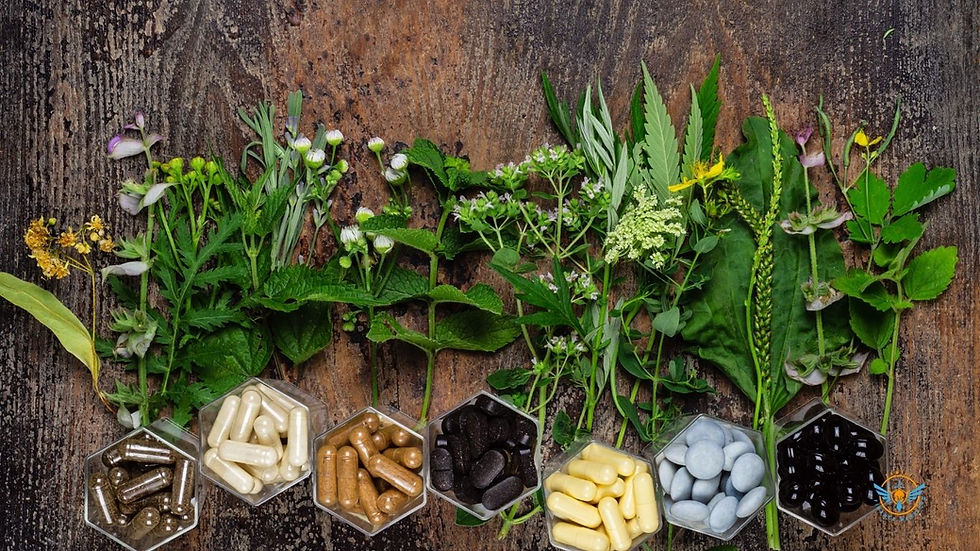How to Prevent Cancer Naturally: Research-Based Habits That Really Work
- Manny A

- Oct 20, 2025
- 4 min read

In recent years, scientists have uncovered that fighting cancer isn’t just about what you eat—it’s about how you live. From fasting and fitness to sunlight and sleep, your daily habits influence your immune system, inflammation levels, and even how your cells repair DNA damage.
While chemotherapy and prescription drugs remain essential for many, growing research shows that lifestyle-based, non-drug approaches can support prevention, recovery, and long-term resilience. Let’s explore the full spectrum of scientifically supported methods that empower your body’s natural defenses.
🥗 1. Dietary Patterns That Heal
You may already know about cancer-fighting foods like cruciferous vegetables, berries, garlic, and turmeric—but the overall pattern matters just as much.
A plant-forward Mediterranean-style diet rich in colorful fruits, vegetables, whole grains, legumes, nuts, and seeds can reduce inflammation and support immune balance.According to the American Cancer Society (ACS), maintaining a healthy eating pattern at all ages helps lower cancer risk and improve survival outcomes.
✅ Key dietary highlights:
Anti-inflammatory fats: Olive oil, avocados, flaxseeds, and fatty fish (omega-3s).
Fiber-rich foods: Whole grains, beans, lentils—support gut health and detoxification.
Limit: Processed foods, added sugars, and red or processed meats.
Hydration: Drink plenty of water and antioxidant-rich teas.
Some emerging studies suggest calorie restriction or ketogenic-style eating may slow tumor growth in lab models, but these approaches require medical supervision.
💪 2. Physical Activity: One of the Strongest Defenses
Exercise isn’t just about fitness—it’s a potent cancer-fighting tool.Research published by the American Society of Clinical Oncology (ASCO) found that regular activity reduces the risk of several cancers and improves survival among survivors.
🏃♂️ Recommended routine:
150–300 minutes per week of moderate activity (walking, cycling, swimming).
2–3 days per week of strength training to preserve muscle and enhance immune function.
Bonus: Exercise reduces inflammation, fatigue, and stress—all known cancer risk factors.
Combining movement with other interventions (like fasting or mindfulness) can amplify benefits by improving insulin sensitivity and reducing oxidative stress.
⏳ 3. Fasting & Time-Restricted Eating
Fasting is no longer a fringe idea—it’s one of the most researched metabolic interventions for longevity and cancer support.
Studies from NIH and PMC show that intermittent fasting (such as 12–16 hours overnight) can trigger autophagy, the body’s natural cellular cleanup process, while improving insulin control and inflammation.Periodic fasting-mimicking diets (FMD) may protect healthy cells during treatment and enhance resilience.
⚠️ Caution: Fasting isn’t for everyone, especially those who are underweight, diabetic, or in active treatment. Always consult a doctor before beginning.
☀️ 4. Sunlight & Vitamin D: The Natural Immunity Booster
Vitamin D has a strong link to immune regulation and reduced cancer mortality.Moderate sun exposure—about 10–30 minutes several times per week depending on your skin tone and latitude—helps the body make this critical hormone-like nutrient.
Studies published in PubMed and ScienceDirect show that individuals with higher vitamin D levels have lower incidence of colorectal, breast, and prostate cancers.
💡 Pro Tip: Use balanced sun exposure—get light, don’t burn. If sun is limited, take a vitamin D3 supplement under medical guidance.
🧘♀️ 5. Stress Management & Mindfulness
Chronic stress disrupts hormonal balance and weakens the immune system. Mindfulness-based stress reduction (MBSR), which includes yoga and meditation, has shown significant benefits in improving mood, sleep, and anxiety among cancer survivors.
Programs lasting just 8 weeks can lower cortisol levels and boost quality of life, according to studies on PMC and MDPI.
🌼 Easy daily habits:
10 minutes of guided meditation.
Deep breathing before bed.
Gentle yoga or nature walks.
😴 6. Sleep Optimization
Your body repairs itself while you sleep. Poor sleep raises inflammation and disrupts immune regulation. Aim for 7–9 hours per night, with a consistent bedtime and wake time.
Simple strategies include:
Dark, cool room with minimal screens before bed.
Light stretching or journaling to calm your mind.
Morning sunlight exposure to reset circadian rhythm.
Studies in ScienceDirect show better sleep correlates with reduced cancer recurrence risk and improved immune resilience.
⚖️ 7. Other Evidence-Based Lifestyle Trends
✅ Weight Management
Obesity is linked to at least 13 cancers, including breast and colorectal.Maintaining a healthy weight through balanced eating and consistent exercise is one of the strongest prevention tools available.
🚫 Avoid Alcohol and Tobacco
Even moderate alcohol increases cancer risk. Tobacco remains the leading cause of preventable cancer deaths. Choose zero consumption when possible.
🌱 Integrative Therapies
Acupuncture, massage, and gentle movement practices may reduce pain, fatigue, and nausea for those in recovery. Evidence is variable, but many find symptom relief and emotional balance.
🌅 The Anti-Cancer Lifestyle Checklist (Daily Routine)
Category | Simple Habit | Why It Helps |
🌿 Diet | Eat colorful plants, fiber, and omega-3s | Reduces inflammation and nourishes cells |
🏋️ Exercise | 30–45 min brisk walk daily + strength 2x/week | Boosts immune and metabolic health |
⏰ Fasting | 12-hour overnight fast | Supports cellular repair and insulin control |
☀️ Sun & Vit D | 10–30 min safe sunlight or D3 supplement | Strengthens immunity and bone health |
🧘 Mindfulness | 10–20 min meditation or yoga | Reduces stress and inflammation |
😴 Sleep | 7–9 hrs nightly | Promotes cellular healing |
🚭 Alcohol & Tobacco | Avoid both | Lowers overall cancer risk |
📘 Helpful Resources & Guides
American Cancer Society – Nutrition and Physical Activity Guidelines
World Cancer Research Fund – Cancer Prevention Recommendations
Mindfulness-Based Stress Reduction Programs – UC San Diego Center for Mindfulness
⚕️ Medical Disclaimer
This article is for educational purposes only and is not a substitute for professional medical advice, diagnosis, or treatment. Always consult your doctor or oncologist before making any changes to your diet, exercise, fasting routine, or supplement use—especially if you are undergoing cancer treatment or have existing health conditions.









Comments